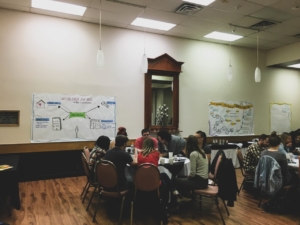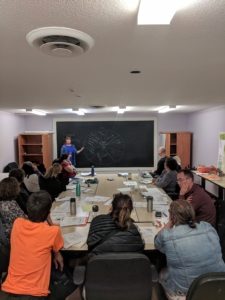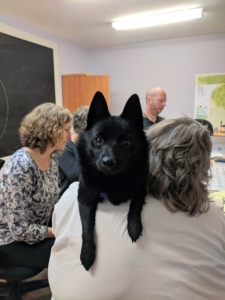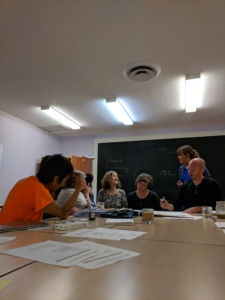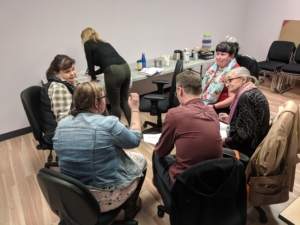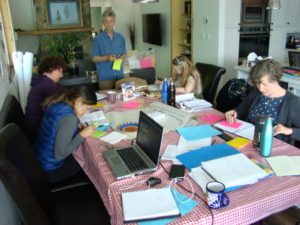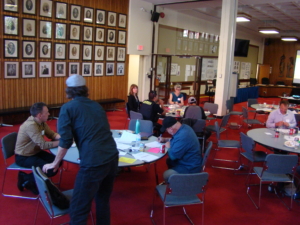Strength through collaboration
The broad central objectives of the AEHCR’s ongoing Tables are to assist the Health & Housing Steering Committee in the development of the Strategic Plan and Business Plan and to facilitate community engagement to support the implementation of projects and inform deliverables. This includes identifying and actioning the requirement of new groups related to carrying out specific tasks and providing the necessary leadership through working with community service organizations to produce the desired results.
Each group meets regularly to provide input, move projects forward, and share concerns in their particular areas of focus. They are attended by anywhere from 5 – 20 people, mainly comprised of service agency representatives, as well as funders and other engaged community members.
The Alliance Tables are as follows:
Health and Housing Steering Committee
The Health and Housing Steering Committee is an advisory committee to the board of the Alliance and its purpose is to gather the leadership of the health and housing sector to address the intersection of the work in the prevention of homelessness.
Duties & Responsibilities
- To assist the AEHCR Members and Staff in the development/update of the Community Plan, and Business Plan;
- To support System Transformation enabling the achievement of the Community Plan to End Homelessness in the Capital Region (Community Plan) Outcomes.
- To assist in the priority setting and timelines for initiative implementation
- To support the collection and reporting of quantitative and qualitative data
- To provide the primary operations support to the AEHCR Staff and to work jointly in implementing the approved Community Plan and Business Plan;
- To work jointly with the AEHCR Staff to ensure deliverables identified within the Business Plan are delivered within scope, according to agreed upon implementation timelines and within budget; and,
- To provide the necessary leadership to ensure approved activities are carried out through the working and/or community service organizations and produce the desired results.
Systems Transformation Working Group
The System Transformation Working Group (STWG) aims to transform the systems of the homelessness sector and housing providers by effectively supporting the implementation of the Community Plan to End Homelessness in the Capital Region.
Duties & Responsibilities
- Convene and facilitate community collaboration, problem-solving, and consultation to support the implementation of the Community Plan to End Homelessness in the Capital Region.
- Provide reports, advice, solutions, and interventions, aligned with previous community-based research activities, reports, and recommendations, to the AEHCR Board of Directors through the Health and Housing Steering Committee.
- Communicate findings, updates, recommendations, and meeting materials to the broader community via the AEHCR network and Working Groups.
- Inform and influence the Capital Region Homeless Response System Transformation.
Lived and Living Experience Council
The purpose of the Lived and Living Experience Council (Council) is to foster a culture of accountability and community belonging, and to ensure the participation and perspective of lived and living experiences (LLE) of homelessness in all activities of the Alliance to End Homelessness in the Capital Region (the Alliance), and to ensure this voice is not tokenised. This will be accomplished in the following ways:
- Equitably participating in decision-making tables
- Equitably participating in the development of new initiatives, ensuring previous reports and recommendations are considered,
- Increasing LLE presence in the community by supporting and leading engagement activities
- Equitably participating in monitoring, learning, and evaluation processes.
Duties & Responsibilities
- Provide advice, solutions and a lived and living experience perspective, aligned with previous community-based research activities, reports, and recommendations, to the Alliance to End Homelessness in the Capital Region (the Alliance) Board of Directors through the Lived and Living Experience Board Directors.
- Communicate findings, updates, recommendations, meeting materials to the broader community via LLE networks, the Alliance network and Alliance Working Groups, including the System Transformation Working Group (STWG) and the Health and Housing Steering Committee.
- Inform and influence the Capital Region Homeless Response System Transformation.
Community Data Dashboard Working Group
The Community Data Dashboard Working Group (CDD-WG) will be the primary community engagement mechanism to provide support for the development, implementation, maintenance, and socialization of the Community Data Dashboard (CDD). This requires a multi-stage process, beginning with the collection of shelter and housing baseline data.
The CDD will support the mission of the AEHCR by providing a snapshot that will be used to inform our progress toward achieving Functional Zero. Two main questions to be addressed through the use of the CDD are:
• Is there enough housing supply to house all persons identified as experiencing homelessness?
• Are there enough appropriate se
Duties & Responsibilities
- Provide the necessary leadership to ensure approved activities are carried out through the working group and/or community service organizations to produce the desired results for the CDD
- Working collaboratively to review and make recommendations on priorities, processes, and resource requirements necessary to develop, implement, maintain, and socialize the CDD
Development
– Advise on baseline data collection policies and procedures related to the CDD
– Support the collection and reporting of quantitative and qualitative data
– Identify barriers, gaps, process improvement, and system transformation needed to develop, implement, maintain, and socialize the CDD
– Further develop intended key indicators for the CDD related to achieving Functional Zero in the Greater Victoria region
– Identify and action the requirement for new/ad hoc groups related to carrying out specific tasks related to identified deliverablesImplementation and maintenance
– Review and inform ongoing deliverables as they are being developed by the CDD-WG and/or selected consultantsSocialization
– Communicate CDD work to organizations, networks, and communities, and looping information from their respective organizations, networks, and communities back to the CDD-WG, ensuring a multi-way flow of information
– Champion the work of the CDD-WG in their respective organizations, networks, and communities by acting as a liaison/ambassador to solicit support
Best Practices Collective
The Best Practices Collective focuses on training for individuals working in the homelessness serving sector. This collective is also looking at ways to align resources and share best practices for those working in the sector.
Currently the work of the BPC centers on the Fundamentals for the Homelessness Serving Sector (FHSS) micro-credential program, collaboratively developed by the University of Victoria and the Alliance to End Homelessness in the Capital Region.
The FHSS micro-credential program provides accessible and flexible training for employees, volunteers, and allies as supporting people who are experiencing homelessness or are at-risk of homelessness requires a specialized skillset. Designed through deep engagement with local housing providers and peers in community and aligned with sector and peer identified needs, this online, self-paced six course micro-credential program supports learners to develop critical competencies and skills.
Areas of Engagement
- Methods to meet the challenge of recruiting and retaining qualified staff.
- Potential for connecting and sharing costs to bring in instructors for different courses, such as having cohorts from multiple agencies in the same training to learn from each other.
- Exploration of opportunities to share internal training resources and best practices, such as risk mitigation strategies/processes, WorkSafe compliance, and other resources.
Community Engagement and Communications Working Group
The purpose of the Community Engagement and Communications Working Group (CECWG) is to amplify the voices of people with lived & living experiences of homelessness, and the sector to reach its goal of functional zero by 2030 through the development and implementation of sector-wide advocacy and communications plan. The plan encompasses internal and external communications that inform, engage, and promote our collective influence to adequately resource the sector, support quality improvements, and drive system transformation.
Duties & Responsibilities
- Assist the Health and Housing (H&H) Steering Committee in the development/update of the Strategic Plan (Appendix A) and Business Plan and work collaboratively in its implementation
- Facilitate broad community engagement and provide primary operations support to the H&H Steering Committee
- Provide necessary leadership to ensure approved activities are carried out through the working and/or community service organizations and produce the desired results
- Support the development and implementation of identified projects. The projects will be updated annually to reflect the Business Plan
- Provide input in the development of the Communications plan as necessary
- Ensure regular flow of information across all Alliance members.
- Inform and influence the Capital Region Homelessness Response System Transformation
This committee is currently in hiatus as we reorganize our work.
Youth Task Force
To collaboratively develop strategies and initiatives that address the systemic and individual challenges for youth experiencing homelessness in Greater Victoria, including addressing systems gaps through a prevention framework where the distinct needs of youth are front and centre through all intervention activities.
This task force is is currently in hiatus as we reorganize our work.
